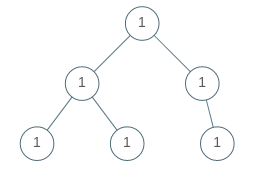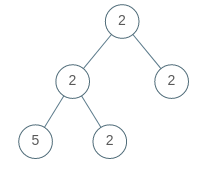A binary tree is univalued if every node in the tree has the same value.
Return true if and only if the given tree is univalued.
Input: [1,1,1,1,1,null,1]
Output: true
Input: [2,2,2,5,2]
Output: false
- The number of nodes in the given tree will be in the range
[1, 100]. - Each node's value will be an integer in the range
[0, 99].
- java
- mine
Runtime: 0 ms, faster than 100.00% of Java online submissions/** * Definition for a binary tree node. * public class TreeNode { * int val; * TreeNode left; * TreeNode right; * TreeNode(int x) { val = x; } * } */ class Solution { int val = -1; public boolean isUnivalTree(TreeNode root) { if(root == null){ return true; } if(val == -1){ val = root.val; } if(val != root.val){ return false; } if(root.left == null && root.right == null){ return true; } return isUnivalTree(root.left) && isUnivalTree(root.right); } }
- mine

